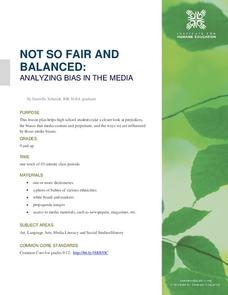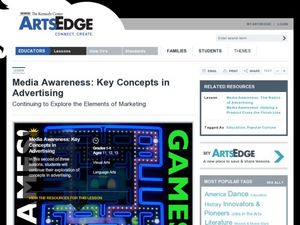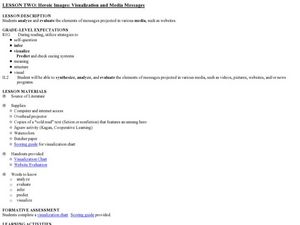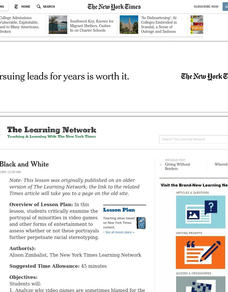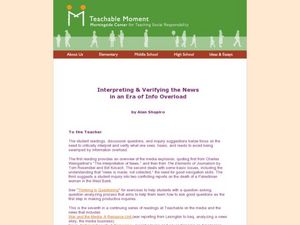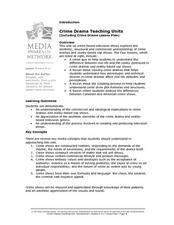Media Smarts
Taking Charge of TV Violence
Encourage your class to become aware of the violence that is present in children's television programs and how this violence can influence children. Do this by holding the planned class discussion in this lesson plan and providing...
Constitutional Rights Foundation
Understanding Fake News
Fake or fact? Learners must decide while looking at two published "news" stories. A reading about why fake news exists and a checklist on how to evaluate sources rounds out the activity.
News Literacy Project
News Goggles: Lionel Ramos, Oklahoma Watch
Given all the recent criticism of the news media and coverage, it's crucial that young people are given the tools they need to evaluate what they see, hear, and read about current events. A video interview from "News Goggles" introduces...
Southern Poverty Law Center
Analyzing How Words Communicate Bias
Words are powerful ... can your class choose them wisely? Scholars evaluate news articles to discover the concepts of tone, charge, and bias during a media literacy lesson. The resource focuses on recognizing implicit information and...
Curated OER
Grapes of Wrath: Setting up Historical Context
Discuss life in the 1930s in relation to the Dust Bowl and Great Depression, then do a cross-media analysis. Here you'll find background information on film maker John Ford, writer John Steinbeck, and 1930s America. You can compare the...
Media Smarts
The Impact of Gender Role Stereotypes
One of three lessons on gender stereotype, this resource from the Media Awareness Network discusses the violence that is inflicted on men and women as they try to live up to the stereotypes of their gender. The section on women focuses...
Newseum
Bias Through History: Analyzing Historical Sources
Young journalists use the E.S.C.A.P.E. (evidence, source, context, audience, purpose, and execution) strategy to evaluate historical and contemporary examples of bias in the news. The class then uses the provided discussion questions to...
Media Smarts
Unit Two: Celebrities and World Issues
Develop media smarts by considering the power of celebrity involvement in world issues. A look at the work of such celebrities as Angelina Jolie, Oprah, and Bono prepare learners to develop their own media campaign for a global...
Institute for Humane Education
Not So Fair and Balanced: Analyzing Bias in the Media
Life is not always fair. Who's heard that before? This same concept moves to a larger scale using prejudice and bias. Pupils discuss where prejudice attitudes derive and how they develop throughout life. Reading comprehension...
Media Smarts
Cinema Cops
A study of how public perception is both reflected and influenced by film and television, this instructional activity helps students develop an awareness of audience as well as a critical view of media. Depictions of police in television...
Curated OER
Media Bias
Students analyze mass media to analyze media bias. In this media bias lesson plan, students read example situations and definitions about media bias. Students read and discuss how to be aware of media bias.
Curated OER
The Power of One: Convergence in Scholastic Media
Pupils explore the different forms of media utilized by journalism including writing, photography, video, sound and the Internet. In this journalism lesson, students compare and contrast the ways in which information is presented between...
Newseum
'The Press and the Civil Rights Movement' Video Lesson
Scholars watch a video featuring journalists who covered the civil rights movement, then respond to questions on a viewing guide. The video features interviews with participants and original news footage from the 1950s and 1960s. In...
Newseum
Free Press Challenges Through History: Analyzing Historical Sources
The debate over the integrity of stories in media is not new. Young journalists analyze historical sources that reveal freedom of the press controversies and draw parallels to challenges freedom of the press faces today.
Curated OER
Children's Media and Censorship
High schoolers form opinions about children and television censorship after analyzing literature. They complete a journal writing activity to identify the topic and make a list of inappropriate television shows for children. Next, they...
Curated OER
Is the media aiding Global Peace when reporting on religion?
Young scholars play 'telephone' to simulate communication difficulties. In this media analysis lesson, students read and analyze newspaper articles related to religious tensions between the Pope and Muslims. Young scholars evaluate the...
Curated OER
Rules of Conduct: Media Violence, Dating and Teenage Behavior
Students discuss the role of media in their lives and making decisions. In groups, they define violence and identify how it is represented in the type of entertainment they are accustomed to viewing. They compare and contrast behaviors...
Curated OER
Media Awareness: Key Concepts in Advertising
Learners examine the basic concepts of advertising. In this media awareness lesson, students discuss target audience, art, and purpose in advertising to determine what makes an advertisement effective or ineffective. Learners evaluate...
Curated OER
Heroic Images: Visualization and Media Messages
Students examine media messages. In this media awareness lesson, students analyze online messages about heroism as they complete a jigsaw reading activity.
Curated OER
Beyond Black and White
Students critically examine the portrayal of minorities in video games and other forms of entertainment and assess the role of racial stereotyping. They keep a log of media minority portrayals and respond to their findings.
Curated OER
Interpreting & Verifying the News in an Era of Info Overload
Students practice their critical thinking skills. In this media awareness lesson, students read articles about media overload and interpretation of media. Students respond to discussion questions and discuss how they verify news....
Curated OER
Crime Drama Teaching Units
Investigate the nature of crime dramas on television. What exactly are they trying to portray? Questions and a comparison chart support learners as they watch shows from Canada, Great Britain, and the United States. An oral presentation...
Media Smarts
Media Awareness Network: Hate or Debate?
Discuss the difference between legitimate debate on a political issue and arguments that are based on hate through a science-fiction scenario that shows how a controversial issue can be discussed in both ways. Then learn how purveyors of...
Curated OER
Vanishing Verbs
Young scholars analyze recent media trends, and develop critical thinking skills by summarizing main ideas, extracting details, formulating opinions, drawing inferences, and comparing and contrasting attitudes. They also practice...










